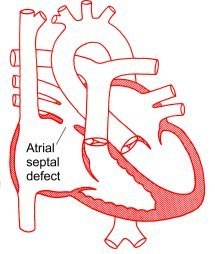An atrial septal defect is a hole in the heart wall that normally separates the right side of the heart from the left. This hole causes problems with blood flow through the heart and body and forces the right side to work harder. It also causes “flooding” of the lungs and respiratory distress because of excessive blood flow.
Atrial septal defects can be repaired through several different types of procedures:
Surgery
Dr. Ciuffo will make a small 2″ incision on the chest wall. He will then close the ASD with a suture line or a patch of the patient’s own tissue. Minimally invasive surgery patients have the advantages of having a very small scar, significantly less pain, and a quick recovery compared to other methods.
Medicine
For newborns with a small atrial septal defect, showing no heart failure symptoms and responding well to medical therapy, a pediatric cardiologist will typically observe the patient and wait for the atrial septal defect to close spontaneously. Small ASDs tend to close spontaneously and present very light symptoms. In this case, the baby will have regular physical examinations and echocardiograms. However, in some small ASD cases, ASD is diagnosed much later in life. Adult patients are diagnosed typically because of the onset of new symptoms or finding a heart murmur during a routine exam.
Catheter
In some cases, the ASD can be closed with a catheter intervention. A thin, long catheter is inserted through the groin and positioned in the heart across the ASD. The catheter will then deploy and anchor a special mechanical patch, known as the “clamshell” device. The device consists of two wire and silicone disks that are deployed to “sandwich” the atrial septal defect closed.
Dr. Ciuffo and the Minimally Invasive and Bloodless Heart Surgery Program
Dr. Ciuffo is dedicated to ensuring your atrial septal defect repair is successful and that you have a low recovery time. If you have any questions about ASD or the treatments Dr. Ciuffo will use to help patients with this condition, feel free to contact us at (330) 588-4676 or visit our contact page online.

